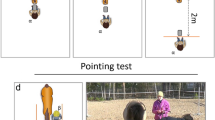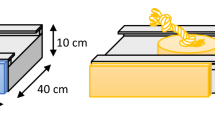Abstract
Humans are part of the environment of domestic animals and interact with them daily, providing a good basis for the study of interspecific relationships. Abilities to discriminate and recognise individuals form the basis of these relationships, and they are crucial skills for domestic animals, since individual humans can differ in their behaviour towards them. At the same time, with experience, animals may develop a general memory of humans and generalise their behaviour towards strangers. This study aimed to determine the extent to which weaned piglets can discriminate familiar humans and generalise their past experience when faced with unfamiliar humans. Forty-eight groups of three piglets were submitted to two consecutive 5-day conditioning periods of the same or opposite valence (positive and/or negative) given by one (A) or two (A then B) handlers. The reactivity of piglets to a motionless human and to an approaching human was measured before and after conditioning periods with unfamiliar and familiar handlers. Thereafter, piglets which received treatments with the two handlers A and B were subjected to a choice test between both handlers. The reactivity to an approaching human appeared to better reflect the past experience with familiar handlers since piglets clearly recognised them and adapted their behaviour accordingly. In contrast, reaction of piglets to a motionless human reflected their natural propensity to seek interaction, even after a negative experience. Although piglets were able to extend their memory of humans to an unfamiliar human through generalisation, many factors seemed to interact in this process, especially the complexity of the previous experience (inconsistent vs consistent) and the context in which piglets met the unfamiliar human (motionless vs approaching). We conclude that discrimination and generalisation processes of reactivity to humans do not simply rely on past interactions, but also depend on the context according to the degree of similitude with their past experience.








Similar content being viewed by others
References
Abrams RA, Christ SE (2003) Motion onset captures attention. Psychol Sci 14(5):427–432. doi:10.1111/1467-9280.01458
Albarella U, Dobney K, Ervynck A, Rowley-Conwy P (2007) Pigs and humans: 10,000 years of interaction. Oxford University Press, New York
Albiach-Serrano A, Bräuer J, Cacchione T, Zickert N, Amici F (2012) The effect of domestication and ontogeny in swine cognition (Sus scrofa scrofa and S. s. domestica). Appl Anim Behav Sci 141:25–35. doi:10.1016/j.applanim.2012.07.005
Boivin X, Nowak R, Desprès G, Tournadre H, Le Neindre P (1997) Discrimination between shepherds by lambs reared under artificial conditions. J Anim Sci 75:2892–2898
Brajon S, Laforest JP, Bergeron R, Tallet C, Hötzel MJ, Devillers N (2015) Persistency of the piglet’s reactivity to the handler following a previous positive or negative experience. Appl Anim Behav Sci 162:9–19. doi:10.1016/j.applanim.2014.11.009
Breuer K, Hemsworth PH, Coleman GJ (2003) The effect of positive or negative handling on the behavioural and physiological responses of nonlactating heifers. Appl Anim Behav Sci 84:3–22. doi:10.1016/S0168-1591(03)00146-1
Call J (2001) Chimpanzee social cognition. Trends Cogn Sci 5:388–393
CCAC (2009) Canadian Council on Animal Care guideline on: the care and use of farm animals in research, teaching and testing. Canadian Council on Animal Care, Ottawa in Science
Davis H, Gibson JA (2000) Can rabbits tell humans apart?: discrimination of individual humans and its implications for animal research. Comp Med 50:483–485
Davis H, Taylor A (2001) Discrimination between individual humans by domestic fowl (Gallus gallus domesticus). Br Poult Sci 42:276–279. doi:10.1080/00071660120048564
Davis H, Norris C, Taylor A (1998) Wether ewe know me or not: the discrimination of individual humans by sheep. Behav Processes 43:27–32. doi:10.1016/S0376-6357(97)00082-X
Destrez A, Coulon J, Deiss V, Delval E, Boissy A, Boivin X (2013) The valence of the long-lasting emotional experiences with various handlers modulates discrimination and generalization of individual humans in sheep. J Anim Sci 91:5418–5426. doi:10.2527/jas.2012-5654
Eguchi Y, Tanida H, Tanaka T, Yoshimoto T (1997) Color discrimination in wild boar. J Ethol 15:1–7
Fureix C, Jego P, Sankey C, Hausberger M (2009) How horses (Equus caballus) see the world: humans as significant “objects”. Anim Cogn 12:643–654. doi:10.1007/s10071-009-0223-2
Gácsi M, Miklósi Á, Varga O, Topál J, Csányi V (2004) Are readers of our face readers of our minds? Dogs (Canis familiaris) show situation-dependent recognition of human’s attention. Anim Cogn 7:144–153. doi:10.1007/s10071-003-0205-8
Gerlai R, Fernandes Y, Pereira T (2009) Zebrafish (Danio rerio) responds to the animated image of a predator: towards the development of an automated aversive task. Behav Brain Res 201:318–324. doi:10.1016/j.bbr.2009.03.003
Haslerud GM (1938) The effect of movement of stimulus objects upon avoidance reactions in chimpanzees. J Comp Psychol 25:507–528. doi:10.1037/h0063562
Hausberger M, Fureix C, Bourjade M, Wessel-Robert S, Richard-Yris M-A (2012) On the significance of adult play: what does social play tell us about adult horse welfare? Naturwissenschaften 99:291–302. doi:10.1007/s00114-012-0902-8
Hediger HKP (1981) The Clever Hans phenomenon from an animal psychologist’s point of view. Ann N Y Acad Sci 364:1–17. doi:10.1111/j.1749-6632.1981.tb34459.x
Held SDE, Špinka M (2011) Animal play and animal welfare. Anim Behav 81:891–899. doi:10.1016/j.anbehav.2011.01.007
Held SDE, Byrne RW, Jones S, Murphy E, Friel M, Mendl MT (2010) Domestic pigs, Sus scrofa, adjust their foraging behaviour to whom they are foraging with. Anim Behav 79:857–862. doi:10.1016/j.anbehav.2009.12.035
Hemsworth PH, Barnett JL, Hansen C, Gonyou HW (1986) The influence of early contact with humans on subsequent behavioural response of pigs to humans. Appl Anim Behav Sci 15:55–63. doi:10.1016/0168-1591(86)90022-5
Hemsworth PH, Barnett JL, Hansen C (1987) The influence of inconsistent handling by humans on the behaviour, growth and corticosteroids of young pigs. Appl Anim Behav Sci 17:245–252. doi:10.1016/0168-1591(87)90149-3
Hemsworth PH, Coleman GJ, Cox M, Barnett JL (1994) Stimulus generalization: the inability of pigs to discriminate between humans on the basis of their previous handling experience. Appl Anim Behav Sci 40:129–142. doi:10.1016/0168-1591(94)90077-9
Hemsworth PH, Rice M, Karlen MG, Calleja L, Barnett JL, Nash J, Coleman GJ (2011) Human–animal interactions at abattoirs: relationships between handling and animal stress in sheep and cattle. Appl Anim Behav Sci 135:24–33. doi:10.1016/j.applanim.2011.09.007
Hinde RA (1987) Individuals, relationships and culture. Links between ethology and the social sciences. Cambridge University Press, Cambridge
Jensen P, Stangel G (1992) Behaviour of piglets during weaning in a seminatural enclosure. Appl Anim Behav Sci 33:227–238. doi:10.1016/S0168-1591(05)80010-3
Keller FS, Schoenfeld WN (1950) Principles of psychology. A systematic text in the science of behaviour. Appleton-Century-Crofts, New York
Kerepesi A, Dόka A, Miklósi Á (2015) Dogs and their human companions: the effect of familiarity on dog-human interactions. Behav Process 110:27–36. doi:10.1016/j.beproc.2014.02.005
Koba Y, Tanida H (1999) How do miniature pigs discriminate between people? The effect of exchanging cues between a non-handler and their familiar handler on discrimination. Appl Anim Behav Sci 61:239–252. doi:10.1016/S0168-1591(98)00192-0
Koba Y, Tanida H (2001) How do miniature pigs discriminate between people? Discrimination between people wearing coveralls of the same colour. Appl Anim Behav Sci 73:45–58. doi:10.1016/S0168-1591(01)00106-X
Kornum BR, Knudsen GM (2011) Cognitive testing of pigs (Sus scrofa) in translational biobehavioral research. Neurosci Biobehav Rev 35:437–451. doi:10.1016/j.neubiorev.2010.05.004
Lampe JF, Andre J (2012) Cross-modal recognition of human individuals in domestic horses (Equus caballus). Anim Cogn 15:623–630. doi:10.1007/s10071-012-0490-1
Magnani D, Cafazzo S, Calà P, Costa LN (2012) Searching for differences in the behavioural response of piglets groups subjected to novel situations. Behav Process 89:68–73. doi:10.1016/j.beproc.2011.10.019
Mateo JM (2004) Recognition systems and biological organization: the perception component of social recognition. Ann Zool Fennici 41:729–745
McLeman MA, Mendl M, Jones RB, White R, Wathes CM (2005) Discrimination of conspecifics by juvenile domestic pigs, Sus scrofa. Anim Behav 70:451–461. doi:10.1016/j.anbehav.2004.11.013
McLeman MA, Mendl MT, Jones RB, Wathes CM (2008) Social discrimination of familiar conspecifics by juvenile pigs, Sus scrofa: development of a non-invasive method to study the transmission of unimodal and bimodal cues between live stimuli. Appl Anim Behav Sci 115:123–137. doi:10.1016/j.applanim.2008.06.010
Mendl M, Randle K, Pope S (2002) Young female pigs can discriminate individual differences in odours from conspecific urine. Anim Behav 64:97–101. doi:10.1006/anbe.2002.3040
Miklósi Á, Topál J (2013) What does it take to become ‘best friends’? Evolutionary changes in canine social competence. Trends Cogn Sci 17:287–294. doi:10.1016/j.tics.2013.04.005
Miklósi Á, Kubinyi E, Topál J, Gácsi M, Virányi Z, Csányi V (2003) A simple reason for a big difference: wolves do not look back at humans, but dogs do. Curr Biol 13:763–766. doi:10.1016/S0960-9822(03)00263-X
Munksgaard L, De Passillé AM, Rushen J, Thodberg K, Jensen MB (1997) Discrimination of people by dairy cows based on handling. J Dairy Sci 80:1106–1112
Nawroth C, Ebersbach M, von Borell EH (2013a) Juvenile domestic pigs (Sus scrofa domestica) use human-given cues in an object choice task. Anim Cogn 17:701–713. doi:10.1007/s10071-013-0702-3
Nawroth C, Ebersbach M, Von Borell EH (2013b) Are juvenile domestic pigs (Sus scrofa domestica) sensitive to the attentive states of humans? - The impact of impulsivity on choice behaviour. Behav Process 96:53–58. doi:10.1016/j.beproc.2013.03.002
Pavlov IP (1927) Conditioned reflexes. Routledge and Kegan Paul, London
Pratt J, Radulescu PV, Guo RM, Abrams RA (2010) It’s alive!: animate motion captures visual attention. Psychol Sci 21:1724–1730
Proops L, McComb K (2012) Cross-modal individual recognition in domestic horses (Equus caballus) extends to familiar humans. Proc R Soc B Biol Sci 279:3131–3138. doi:10.1098/rspb.2012.0626
Ratcliffe VF, McComb K, Reby D (2014) Cross-modal discrimination of human gender by domestic dogs. Anim Behav 9:127–135. doi:10.1016/j.anbehav.2014.03.009
Rushen J, Taylor AA, de Passillé AM (1999) Domestic animals’ fear of humans and its effect on their welfare. Appl Anim Behav Sci 65:285–303. doi:10.1016/S0168-1591(99)00089-1
Rushen J, Munksgaard L, Marnet PG, de Passillé AM (2001) Human contact and the effects of acute stress on cows at milking. Appl Anim Behav Sci 73:1–14. doi:10.1016/S0168-1591(01)00105-8
Sommavilla R, Hötzel MJ, Dalla Costa OA (2011) Piglets’ weaning behavioural response is influenced by quality of human–animal interactions during suckling. Animal 5:1426–1431. doi:10.1017/S1751731111000358
Špinka M, Newberry RC, Bekoff M (2001) Mammalian play: training for the unexpected. Q Rev Biol 76:141–168. doi:10.1086/393866
Tallet C, Veissier I, Boivin X (2005) Human contact and feeding as rewards for the lamb’s affinity to their stockperson. Appl Anim Behav Sci 94:59–73. doi:10.1016/j.applanim.2005.02.007
Tanida H, Nagano Y (1998) The ability of miniature pigs to discriminate between a stranger and their familiar handler. Appl Anim Behav Sci 56:149–159. doi:10.1016/S0168-1591(97)00095-6
Tanida H, Miura A, Tanaka T, Yoshimoto T (1995) Behavioral response to humans in individually handled weanling pigs. Appl Anim Behav Sci 42:249–259. doi:10.1016/0168-1591(94)00545-P
Taylor AA, Davis H (1998) Individual humans as discriminative stimuli for cattle (Bos taurus). Appl Anim Behav Sci 58:13–21. doi:10.1016/S0168-1591(97)00061-0
Terlouw EMC, Porcher J (2005) Repeated handling of pigs during rearing. I. Refusal of contact by the handler and reactivity to familiar and unfamiliar humans. J Anim Sci 83:1653–1663
Tibbetts EA, Dale J (2007) Individual recognition: it is good to be different. Trends Ecol Evol 22:529–537. doi:10.1016/j.tree.2007.09.001
Tolon V, Dray S, Loison A, Zeileis A, Fischer C, Baubet E (2009) Responding to spatial and temporal variations in predation risk: space use of a game species in a changing landscape of fear. Can J Zool 87:1129–1137. doi:10.1139/Z09-101
Waiblinger S, Boivin X, Pedersen V, Tosi MV, Janczak AM, Visser EK, Jones RB (2006) Assessing the human–animal relationship in farmed species: a critical review. Appl Anim Behav Sci 101:185–242. doi:10.1016/j.applanim.2006.02.001
Wisenden BD, Harter KR (2001) Motion, not shape, facilitates association of predation risk with novel objects by fathead minnows (Pimephales promelas). Ethology 107:357–364. doi:10.1046/j.1439-0310.2001.00667.x
Wood-Gush DGM, Vestergaard K (1991) The seeking of novelty and its relation to play. Anim Behav 42:599–606. doi:10.1016/S0003-3472(05)80243-X
Acknowledgments
The work would not have been the same without the valuable assistance of Sabine Conte and Marjolaine St-Louis. The authors thank Steve Méthot for helping with the statistical analysis and the staff of the Swine Complex, particularly Mélanie Turcotte and Édouard Bérubé, for caring for the animals and providing a good management. This project and S. Brajon Ph.D. studentship were funded by Agriculture and Agri-Food Canada.
Author information
Authors and Affiliations
Corresponding author
Rights and permissions
About this article
Cite this article
Brajon, S., Laforest, JP., Bergeron, R. et al. The perception of humans by piglets: recognition of familiar handlers and generalisation to unfamiliar humans. Anim Cogn 18, 1299–1316 (2015). https://doi.org/10.1007/s10071-015-0900-2
Received:
Revised:
Accepted:
Published:
Issue Date:
DOI: https://doi.org/10.1007/s10071-015-0900-2




